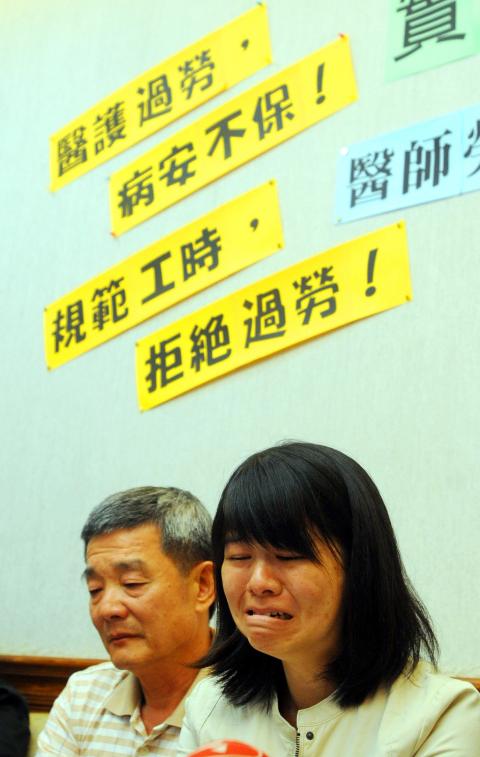The working conditions of medical personnel, particularly of nurses, has come into the spotlight after the Control Yuan passed a resolution on Tuesday censuring three government agencies for harsh working conditions at hospitals.
After nearly a year of investigations, a panel of Control Yuan members said in the resolution that the Executive Yuan, the Department of Health and the Council of Labor Affairs should be blamed for sweatshop working conditions at government-run hospitals.
The resolution traced the root cause back to the Executive Yuan’s failure to adopt complementary measures to meet hospitals’ special manpower needs when it implemented the five-day working week in the early 2000s.

Photo: Wang Min-wei, Taipei Times
As a result, government-run hospitals have since faced a 9 percent manpower shortage, which has led to a heavy work burden for hospital staff, nurses in particular, the resolution said.
As the issue involves national security, relevant government agencies should take it seriously, the Control Yuan said in its resolution.
Yin Jeo-chen (尹祚芊), who headed the nursing department at Taipei Veterans General Hospital before serving as a Control Yuan member, said more than 30 percent of hospitals have failed to pass annual labor management inspections in the past four years.
“It is extremely regrettable that the labor council has failed to take any steps to improve the situation,” the resolution said.
Yin said the five-day working week and a flawed payment system under the National Health Insurance System have led to manpower shortages at public hospitals which led to staff being overworked.
“A nurse at a state-run hospital usually has to look after 13.5 patients on average,” Yin said, adding that nurses often need to work four to five hours overtime a day.
Such a situation not only endangers patients’ lives, but it also affects nurses’ health, Yin said.
While enduring long working hours, nurses are also terribly underpaid, the resolution said, adding that the Department of Health should be held accountable for dragging its feet on revising hospital management regulations.
Meanwhile, Maggie Lin, a nurse, has uploaded an article on harsh working conditions to CNN’s iReport Web site entitled: The dark moment of nurses in Taiwan.
In it she complains about the miserable working conditions faced by herself and her colleagues. Her views reflect the Control Yuan panel’s findings.
Lin said in her article that the National Health Insurance System seems to have created a wonderful medical market where everyone can obtain treatment while paying low medical bills.
However, all hospitals are impaired by staff shortages and the government does not even recognize what the real problems are.
The National Health Insurance System has resulted in low salaries for nurses, longer working hours, some without pay, and a high nurse-to-patient ratio, she added.
Responding to the Control Yuan censure, Chen Hui-ling (陳慧玲), director of the Council of Laobor Affairs’ labor conditions department, said the council has worked out a timetable that requires medical and healthcare institutions to abide by the working conditions set forth in the Labor Standards Act (勞動基準法).
The Department of Health said it has unveiled new management rules that demand medical institutions increase the number of doctors and nurses working each shift.

Taiwan is stepping up plans to create self-sufficient supply chains for combat drones and increase foreign orders from the US to counter China’s numerical superiority, a defense official said on Saturday. Commenting on condition of anonymity, the official said the nation’s armed forces are in agreement with US Admiral Samuel Paparo’s assessment that Taiwan’s military must be prepared to turn the nation’s waters into a “hellscape” for the Chinese People’s Liberation Army (PLA). Paparo, the commander of the US Indo-Pacific Command, reiterated the concept during a Congressional hearing in Washington on Wednesday. He first coined the term in a security conference last

Prosecutors today declined to say who was questioned regarding alleged forgery on petitions to recall Democratic Progressive Party (DPP) legislators, after Chinese-language media earlier reported that members of the Chinese Nationalist Party (KMT) Youth League were brought in for questioning. The Ministry of Justice Investigation Bureau confirmed that two people had been questioned, but did not disclose any further information about the ongoing investigation. KMT Youth League members Lee Hsiao-liang (李孝亮) and Liu Szu-yin (劉思吟) — who are leading the effort to recall DPP caucus chief executive Rosalia Wu (吳思瑤) and Legislator Wu Pei-yi (吳沛憶) — both posted on Facebook saying: “I

Sung Chien-liang (宋建樑), who led efforts to recall Democratic Progressive Party (DPP) Legislator Lee Kun-cheng (李坤城), was released on bail of NT$80,000 today amid outcry over his decision to wear a Nazi armband to questioning the night before. Sung arrived at the New Taipei District Prosecutors’ Office for questioning in a recall petition forgery case last night wearing a red armband bearing a swastika, carrying a copy of Adolf Hitler’s Mein Kampf and giving a Nazi salute. Sung left the building at 1:15am without the armband and covering the book with his coat. Lee said today that this is a serious

A mountain blaze that broke out yesterday morning in Yangmingshan National Park was put out after five hours, following multi agency efforts involving dozens of fire trucks and helicopter water drops. The fire might have been sparked by an air quality sensor operated by the National Center for High-Performance Computing, one of the national-level laboratories under the National Applied Research Laboratories, Yangmingshan National Park Headquarters said. The Taipei City Fire Department said the fire, which broke out at about 11am yesterday near the mountainous Xiaoyoukeng (小油坑) Recreation Area was extinguished at 4:32pm. It had initially dispatched 72 personnel in four command vehicles, 16